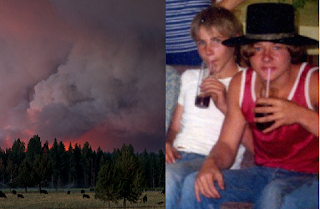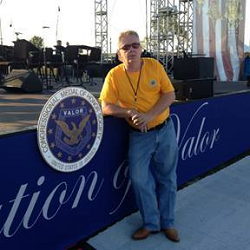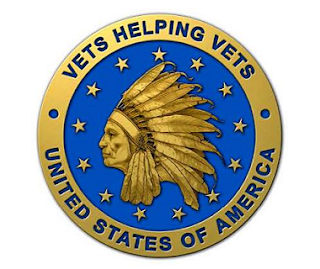David Apperson was born on 3 Sep 1959 at Oregon Health Science University. Due to the fact he was once known as an illegitimate child, he was deemed by the State of Oregon to be a juvenile delinquent and a ward-of-the-state the day he was born.
In November of 1961, the two-year-old boy was taken to GITMO Cuba without proper legal documentation by his stepfather, an active duty Seabee with the U.S. Navy.
A short time after arriving at GITMO, David had his pinky fingers broken because he accidentally shut a sliding door on a cat's tail, scratching his stepbrother.
On 22 Oct 1962, David was evacuated from GITMO with 1702 others due to the global tensions associated with the Cuban Missile Crises. The situation was handled superbly by John F Kennedy and the president's adviser, Dwight D Eisenhower, on effective political and military strategy.
Cuban Missile Crises in World History
--- Adlai Stevenson Addresses the United Nations on the Cuban Missile Crisis
--- Kennedy's Oval Office Address on the Cuban Missile Crises
--- Russian Ideology on the Cuban Missile Crisis
--- Wikipedia: Cuban Missile Crises
During the evacuation, the White House released to the press that all identities of evacuees were properly vetted. In contrast, evacuees headed toward Norfolk, Virginia in four ships, including, but not limited to, the USNS Upshur with roughly 4,000 US Army Rangers originally headed to Panama for Jungle Training.
However, the paperwork of a few of the evacuees had been falsified. This is because at least three children had records and documentation modified to show that they were military dependents, whereby David Apperson was the youngest of the three. Two males and one female. As of 9 July 2023, only the males are still alive.
According to US Navy documents released to the media, a small Baptist Church in the state of Texas gathered winter jackets for children to stay warm while spending time in Virginia.
After the crisis was over, David was sent back to GITMO with other evacuees and remained there until early Nov 1963.
Due to the stress of the Cuban Missile Crises, David began sucking his thumb at the age of three. As a child, David was constantly whipped and beaten for this action until, at the age of five, David was beaten so badly with a navy belt and buckle that he had black and blue welts over his entire back and legs.
From five to ten years of age, David endured some extremely traumatic events:
At 12 years old and weighing less than 70 pounds, David put down an armed guard three times his size at the Ventura County Juvenile Facility in Ventura, California. David was subsequently kicked out of California and sent back to the state of his birth.
In just a few months back in Oregon, David drew a picture for the 'Keep America Beautiful' campaign. He won the top prize of $250 USD. However, after being featured in the local paper on 13 Apr 1973, the townspeople realized the hidden message within the drawing, and David was in trouble. He was confined for three months in the Prineville City Jail and sentenced to nine months at MacLaren School for Boys for being out of parental control.
He was later transferred to the Tillamook Boys Camp, whereby he escaped from the camp. During that cold winter night of freedom he had to decide to save two other escapees at his own peril. After his capture David was sent back to MacLaren and spent two weeks in solitary confinement and then back to his original cottage.
Six months after his escape from the Tillamook Camp, David was sent to the Double T Boys Ranch in Bend, Oregon. And shortly after arriving at the ranch, he became a paid firefighter at 14 years of age. He was also the map reader and radio operator for the last teenage fire crew in Oregon.

Image of David in black hat and another teenage firefighter in summer of 1974.
It was during this summer that David Apperson put an (x) between the eyes of a US Marine.
When 15 the State of Oregon sent David back to the same abusive home situation, whereby an assault is still on record at the Crook County Sheriff Dept from 1975, even though the perpetrator is now deceased.
Not lasting long in Prineville Oregon (Crook County), David went back to the Double T Boy's Ranch, where as a 15 and 16 year old he worked as a night counselor for other foster kids and a cook at the Snow Bunny Restaurant in Bend to pay his expenses and finish high school, after which he entered military service when he turned 17 years of age.

US Army image . . . Fort Leonard Wood.
David was a firefighter, yet did time for another kid's arson. He was treated like a criminal, yet he excelled in law enforcement while stationed in South Korea. A machine gunner who searched for the answer to peace wherever he traveled and the path for him always seem to return to his knowledge of homing pigeons (i.e., carrier or messenger pigeons).
In 1981, on the recommendation of Wayne Hamilton, David was the first inmate invited as a guest speaker who had previously spent time in MacLaren School for Boys.
See article by David Apperson on The Oregon Foster Care System and Incarceration Rates.
David Apperson Memberships
In November of 1961, the two-year-old boy was taken to GITMO Cuba without proper legal documentation by his stepfather, an active duty Seabee with the U.S. Navy.
A short time after arriving at GITMO, David had his pinky fingers broken because he accidentally shut a sliding door on a cat's tail, scratching his stepbrother.
On 22 Oct 1962, David was evacuated from GITMO with 1702 others due to the global tensions associated with the Cuban Missile Crises. The situation was handled superbly by John F Kennedy and the president's adviser, Dwight D Eisenhower, on effective political and military strategy.
Cuban Missile Crises in World History
--- Adlai Stevenson Addresses the United Nations on the Cuban Missile Crisis
--- Kennedy's Oval Office Address on the Cuban Missile Crises
--- Russian Ideology on the Cuban Missile Crisis
--- Wikipedia: Cuban Missile Crises
During the evacuation, the White House released to the press that all identities of evacuees were properly vetted. In contrast, evacuees headed toward Norfolk, Virginia in four ships, including, but not limited to, the USNS Upshur with roughly 4,000 US Army Rangers originally headed to Panama for Jungle Training.
However, the paperwork of a few of the evacuees had been falsified. This is because at least three children had records and documentation modified to show that they were military dependents, whereby David Apperson was the youngest of the three. Two males and one female. As of 9 July 2023, only the males are still alive.
According to US Navy documents released to the media, a small Baptist Church in the state of Texas gathered winter jackets for children to stay warm while spending time in Virginia.
After the crisis was over, David was sent back to GITMO with other evacuees and remained there until early Nov 1963.
Due to the stress of the Cuban Missile Crises, David began sucking his thumb at the age of three. As a child, David was constantly whipped and beaten for this action until, at the age of five, David was beaten so badly with a navy belt and buckle that he had black and blue welts over his entire back and legs.
From five to ten years of age, David endured some extremely traumatic events:
- At five David was made to walk a mile or so alone in midnight darkness to get home
- David had numerous beatings that left black, blue, and red bruises over his body
- At eight years old David was locked and chained to a metal bed because he wanted to Tricker Treat on Halloween
- At nine years of age, stepfather stabbed David with a fork in his left arm (the same arm David would later be bayoneted with while serving on the DMZ in Korea)
- He had a bottle of Tabasco sauce poured down his throat while being held down
- On his 10th birthday (1969), David received a severe head wound from his stepfather, treated at the Port Hueneme Naval Hospital in Port Hueneme, California. Stepfather spent 10 days in jail and subsequently court-martialed by the US Navy.
At 12 years old and weighing less than 70 pounds, David put down an armed guard three times his size at the Ventura County Juvenile Facility in Ventura, California. David was subsequently kicked out of California and sent back to the state of his birth.
In just a few months back in Oregon, David drew a picture for the 'Keep America Beautiful' campaign. He won the top prize of $250 USD. However, after being featured in the local paper on 13 Apr 1973, the townspeople realized the hidden message within the drawing, and David was in trouble. He was confined for three months in the Prineville City Jail and sentenced to nine months at MacLaren School for Boys for being out of parental control.
He was later transferred to the Tillamook Boys Camp, whereby he escaped from the camp. During that cold winter night of freedom he had to decide to save two other escapees at his own peril. After his capture David was sent back to MacLaren and spent two weeks in solitary confinement and then back to his original cottage.
Six months after his escape from the Tillamook Camp, David was sent to the Double T Boys Ranch in Bend, Oregon. And shortly after arriving at the ranch, he became a paid firefighter at 14 years of age. He was also the map reader and radio operator for the last teenage fire crew in Oregon.

Image of David in black hat and another teenage firefighter in summer of 1974.
It was during this summer that David Apperson put an (x) between the eyes of a US Marine.
When 15 the State of Oregon sent David back to the same abusive home situation, whereby an assault is still on record at the Crook County Sheriff Dept from 1975, even though the perpetrator is now deceased.
Not lasting long in Prineville Oregon (Crook County), David went back to the Double T Boy's Ranch, where as a 15 and 16 year old he worked as a night counselor for other foster kids and a cook at the Snow Bunny Restaurant in Bend to pay his expenses and finish high school, after which he entered military service when he turned 17 years of age.

US Army image . . . Fort Leonard Wood.
David was a firefighter, yet did time for another kid's arson. He was treated like a criminal, yet he excelled in law enforcement while stationed in South Korea. A machine gunner who searched for the answer to peace wherever he traveled and the path for him always seem to return to his knowledge of homing pigeons (i.e., carrier or messenger pigeons).
In 1981, on the recommendation of Wayne Hamilton, David was the first inmate invited as a guest speaker who had previously spent time in MacLaren School for Boys.
See article by David Apperson on The Oregon Foster Care System and Incarceration Rates.
David Apperson Memberships
- American Racing Pigeon Union
- Disabled American Veterans
- Jewish War Veterans of the United States
- Korean War Veterans Association
- National Fraternal Order of Police
- National Rifle Association
- Southern Baptist Convention
- Veterans of Foreign Wars














